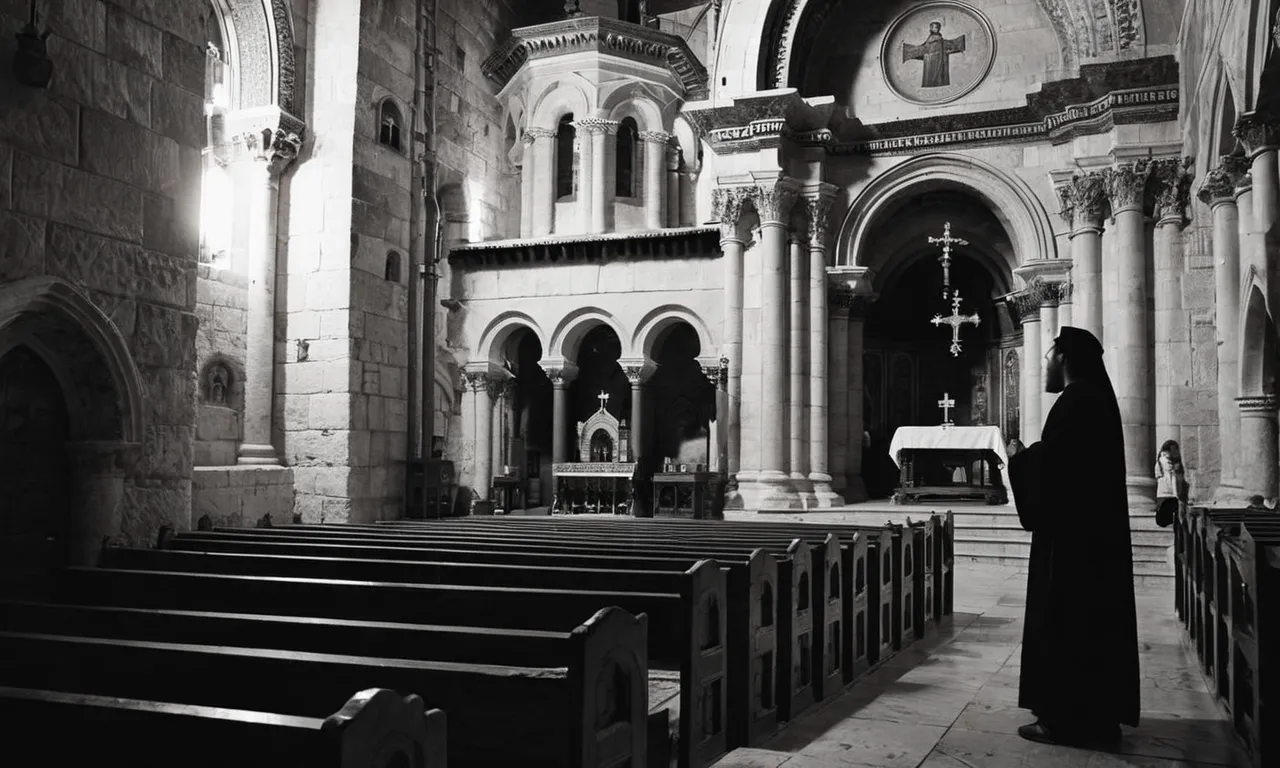Baptist Vs Christian: Understanding The Key Differences
With over 15 million members in the Southern Baptist Convention alone, Baptists make up a significant segment of the Christian faith. Yet some are unclear on how Baptist beliefs differ from other Christian denominations.
If you’re short on time, here’s the key difference in a nutshell: Baptists believe that only adults should be baptized, while other major Christian sects support infant baptism as well.
In this comprehensive guide, we will compare and contrast Baptist theology, organization, worship styles, and other distinctive traits with those of mainline Protestant, Evangelical, and other Christian groups.
Origins and History
Roots of the Baptist movement
The name “Baptist” refers to their belief in adult baptism, which is seen as a public declaration of faith. This belief sets them apart from other Christian denominations that practice infant baptism.
The origins of the Baptist movement can be traced back to the early 17th century in England. One of the key figures in the birth of the Baptist tradition was John Smyth, who is often considered the first Baptist pastor.
He believed in the separation of church and state and advocated for religious freedom.
Key historical figures and events
Throughout history, there have been several influential figures who have shaped the Baptist movement.
One of the most notable figures is Roger Williams, who founded the first Baptist church in America in Rhode Island in the 17th century.
Williams was a strong advocate for religious liberty and played a significant role in the development of the separation of church and state in the United States.
Another important figure in Baptist history is Charles Spurgeon, a prominent preacher in the 19th century. Spurgeon’s sermons and writings had a profound impact on the Baptist community, and he is still widely respected and studied today.
Rise of Baptist associations and conventions
As the Baptist movement grew, various associations and conventions were formed to bring together Baptist churches and promote cooperation among them.
These organizations provided a platform for Baptists to discuss theological matters, engage in missionary work, and address other issues affecting the Baptist community.
One such association is the Southern Baptist Convention (SBC), which is the largest Baptist denomination in the United States.
The SBC was founded in 1845 and has played a significant role in shaping Baptist identity and influencing Baptist churches across the country.
It’s important to note that while Baptists have a shared history and core beliefs, there is also diversity within the Baptist community. Different Baptist groups may have varying interpretations of scripture and different practices and traditions.
Beliefs and Doctrines
When comparing Baptist and Christian beliefs and doctrines, it is important to understand the key differences that exist between these two groups.
While both Baptist and Christian denominations share a common belief in Jesus Christ and the Bible, there are certain theological distinctions that set them apart.
Biblical Literalism and Authority
Baptists generally hold to a belief in biblical literalism, meaning they interpret the Bible as the literal Word of God. They view the Bible as the ultimate authority and guide for their faith and practice.
This belief stems from their conviction that every word in the Bible is divinely inspired and should be taken at face value.
On the other hand, Christians may interpret the Bible more metaphorically or symbolically, taking into account historical and cultural contexts when interpreting its teachings.
Baptists believe in the autonomy of the local church, meaning they reject the notion of a hierarchical structure or central authority governing multiple churches.
Each Baptist congregation is considered independent and self-governing.
Christians, however, may belong to a variety of denominations that have different hierarchical structures and levels of central authority.
Salvation, Baptism, and Communion
One of the key differences between Baptists and Christians lies in their beliefs about salvation, baptism, and communion.
Baptists typically believe in the doctrine of “believer’s baptism,” which means that individuals must make a conscious decision to accept Jesus Christ as their Savior before being baptized.
They view baptism as a public declaration of one’s faith and a symbolic act of obedience to God.
Christians, on the other hand, may practice infant baptism, which is the baptism of infants or young children. They believe that baptism is a sacrament that conveys God’s grace and initiates individuals into the Christian community.
Additionally, Christians may have different views on the significance and frequency of communion, also known as the Lord’s Supper.
Individual Soul Liberty
Another key distinction between Baptists and Christians is the belief in individual soul liberty. Baptists emphasize the freedom of each individual to interpret the Bible according to their own conscience and conviction.
They believe that every person has the right to a personal relationship with God and should not be coerced or forced into religious beliefs or practices.
Christians, while also valuing individual faith and conscience, may have a more communal approach to faith, placing importance on the teachings and traditions of the Church.
They may believe in the authority of the Church in guiding individuals in matters of faith and practice.
It’s important to note that while these are general differences between Baptist and Christian beliefs and doctrines, there is significant diversity within both groups.
Each individual church and denomination may have variations in their specific beliefs and practices.
It is always recommended to consult specific churches or denominations to fully understand their beliefs and doctrines.

Church Organization
When it comes to church organization, there are several key differences between Baptists and Christians. These differences can be seen in areas such as congregational governance, ordination and women in ministry, and the role of Baptist associations and conventions.
Congregational governance
One of the main differences between Baptists and Christians lies in their approach to church governance. Baptists typically adhere to a congregational form of governance, where the ultimate authority rests with the local congregation.
This means that decisions regarding church policies, finances, and leadership are made by the members of the congregation through a democratic process.
On the other hand, Christians may have various forms of governance, such as episcopal (hierarchical) or presbyterian (elders-led), where decisions are made by a higher authority or a group of leaders.
Ordination and women in ministry
Another significant difference between Baptists and Christians is their stance on ordination and the role of women in ministry.
In some Baptist denominations, only men are allowed to be ordained as pastors or hold leadership positions within the church.
This belief stems from their interpretation of certain biblical passages.
However, it’s important to note that not all Baptist churches adhere to this view, as there are Baptist congregations that embrace gender equality and allow women to serve as pastors and hold leadership roles.
On the other hand, many Christian denominations have embraced gender equality in ministry and allow women to be ordained as pastors and hold leadership positions.
Role of Baptist associations and conventions
Baptist associations and conventions play a significant role in the organizational structure of Baptist churches. These associations and conventions provide a platform for cooperation, networking, and resource-sharing among Baptist churches.
They often organize events, conferences, and mission work to promote unity and collaboration among Baptist congregations.
Understanding the differences in church organization between Baptists and Christians can help foster a greater appreciation for the diversity within the Christian faith.
It’s important to note that while there may be variations in how different churches are organized, the ultimate goal remains the same – to serve and worship God.
Worship and Liturgy
Forms of worship and preaching
While both Baptist and Christian denominations are rooted in the Christian faith, there are some key differences in how they approach worship and preaching.
Baptists generally emphasize a more informal and spontaneous style of worship, often characterized by heartfelt expressions of faith and individual interpretation of scripture.
On the other hand, Christians tend to follow a more structured liturgical format, with set prayers, readings, and rituals.
Music and instruments
Another notable difference between Baptist and Christian worship lies in the use of music and instruments. Baptists often embrace a more contemporary approach to music, incorporating a wide variety of instruments and musical styles into their worship services.
They believe that music should be a tool to engage the congregation and enhance their worship experience.
Christians, on the other hand, tend to lean towards traditional hymns and choral arrangements, with a greater emphasis on vocal harmonies and organ accompaniment.
Ordinances and ceremonies
Baptists and Christians also differ in their approach to ordinances and ceremonies. Baptists emphasize two key ordinances: baptism and the Lord’s Supper (also known as communion).
Baptism, according to Baptist belief, is a symbolic act that represents a person’s acceptance of Jesus Christ as their Savior and their commitment to a life of faith.
The Lord’s Supper is a commemoration of Jesus’ Last Supper with his disciples, where bread and wine (or grape juice) are shared to remember his sacrifice.
Christians, on the other hand, may have a broader range of sacraments or ceremonies, such as baptism, confirmation, marriage, and confession.
It is important to note that these differences in worship and liturgy are not meant to create divisions, but rather reflect the diversity within the larger Christian community. Both Baptist and Christian denominations share a common belief in the teachings of Jesus Christ and strive to live out their faith in their daily lives.
Notable Divisions
Southern vs American Baptists
One significant division within the Baptist community is between Southern Baptists and American Baptists. While both groups share similar beliefs in core Christian doctrines, they differ in their organizational structures and theological perspectives.
Southern Baptists are known for their conservative stance on issues such as biblical inerrancy and traditional family values.
They have a hierarchical structure with a centralized authority.
On the other hand, American Baptists tend to be more moderate or liberal in their theological views and have a decentralized structure that allows for more congregational autonomy.
Progressive vs Fundamentalist Baptists
Another notable division within the Baptist community is between progressive and fundamentalist Baptists. This division centers around differing interpretations of the Bible and social issues.
Progressive Baptists tend to have a more open-minded approach to theology and social justice, embracing concepts such as gender equality, LGBTQ+ inclusion, and racial reconciliation.
On the other hand, fundamentalist Baptists adhere to a more literal interpretation of the Bible and often hold conservative views on these same issues.
It’s important to note that not all Baptists fall strictly into one category or the other, as there is a spectrum of beliefs within the Baptist community.
To explore this topic further, you can visit various Baptist forums and organizations that promote progressive or fundamentalist perspectives.
Black Baptists
Black Baptists form a significant subgroup within the Baptist community, with their own unique history and traditions.
The origins of Black Baptists can be traced back to the early days of slavery in the United States when African Americans sought refuge and spiritual freedom within Baptist churches.
Today, Black Baptists continue to have a strong presence in the African American community, with a focus on social justice and empowerment.
They have their own national organizations, such as the National Baptist Convention, USA, Inc., and the Progressive National Baptist Convention.
These organizations provide a platform for Black Baptists to address issues affecting their communities and promote unity among African American believers. For more information on Black Baptists, you can visit the websites of these organizations: National Baptist Convention, USA, Inc. and Progressive National Baptist Convention.
Conclusion
While Baptists fall under the wider Christian tradition, their convictions set them apart on issues of governance, baptism, communion and more. These differences originated centuries ago, though new divisions have formed over time.
By understanding the unique Baptist perspectives on Scripture, salvation, worship practices and church structure, we gain a richer appreciation for this prominent faith group.
This deep dive on the Baptist tradition dispels misconceptions and clearly lays out how it diverged from other Christian denominations over the centuries. Let it provide clarity and foster mutual understanding across our shared Christian faith.







